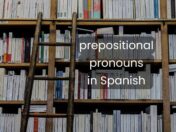Irregular Preterite Verbs: Past Tense Spanish Made Simple

Get our free email course, Shortcut to Conversational.
Have conversations faster, understand people when they speak fast, and other tested tips to learn faster.
More infoPast tense Spanish is something that tends to confuse many Spanish students, especially when dealing with irregular preterite verbs.
Let’s back up a bit about the most important Spanish past tenses.
In the indicative mood, there are two ways to speak about the past tense: the preterite (aka simple past) tense and the imperfect tense.
The Spanish preterite tense is used to describe actions completed at a specific point in the past; whereas the imperfect is used to describe habitual or continuous actions in the past with no specific beginning or end.
For more on preterite vs imperfect tense, read here.
How To Conjugate Irregular Preterite Verbs In Spanish
All verbs listed in the post can be considered irregular.
However, you’ll see that some verbs only require subtle changes, others undergo drastic spelling changes and some, quite frankly, do not abide by any rules whatsoever.
In this post, we are going to categorize irregular verbs into the following:
- Verbs that require significant changes: Ser, Ir, Dar, Hacer, Ver
- Verbs that require a stem change, but use regular endings
- Verbs ending in -ir that require a stem change
- Verbs ending in -ucir
- Verbs that are irregular in the “yo” form
1) Verbs that require significant changes
These verbs belong in the wild west of conjugations.
In other words, they are completely irregular as they do not follow any pattern whatsoever.
- Ser (to be)
- Ir (to go)
- Dar (to give)
- Hacer (to do)
- Ver (to see)
These five verbs are probably the most commonly used irregular verbs in the preterite, and so it’s important to memorize the conjugations by heart.
Let’s dive in.
| Subject | Verb: Ser (to be) | English Equivalent |
| Yo | fui | I was |
| Tú | fuiste | You were |
| Él/Ella/Usted | fue | He/She was |
| Nosotros/Nosotras | fuimos | We were |
| Ellos/Ellas/Ustedes | fueron | They were |
| Subject | Verb: Ir (to go) | English Equivalent |
| Yo | fui | I went |
| Tú | fuiste | You went |
| Él/Ella/Usted | fue | He/She went |
| Nosotros/Nosotras | fuimos | We went |
| Ellos/ellas/Ustedes | fueron | They went |
Sidenote:
Hopefully, you noticed that Ser and Ir verbs have identical conjugations in the preterite.
While this may seem confusing, a reasonably easy and effective trick to tell both verbs apart is to remember that the verb Ir is used when something moves somewhere else, and so it will most likely include prepositions such as the “a”, or alternatively “para”. The only time it doesn’t need a preposition is when a location is already mentioned – usually naming a physical place.
Let’s compare the two below.
- I went to see my neighbor – Fui a ver a mi vecino
- I was his neighbor for many years – Fui su vecino por muchos años
All clear?
Good. Let’s move on.
| Subject | Verb: Dar (to give) | English Equivalent |
| Yo | dí | I gave |
| Tú | diste | You give |
| Él/Ella/Usted | dió | He/She gave |
| Nosotros/Nosotras | dimos | We gave |
| Ellos/Ellas/Ustedes | dieron | They gave |
| Subject | Verb: Hacer (to do or to make) | English Equivalent |
| Yo | hice | I did |
| Tú | hiciste | You did |
| Él/Ella/Usted | hizo | He/She did |
| Nosotros/Nosotras | hicimos | We did |
| Ellos/Ellas/Ustedes | hicieron | They did |
| Subject | Verb: Ver (to see) | English Equivalent |
| Yo | vi | I saw |
| Tú | viste | You saw |
| Él/Ella/Usted | vio | He/She saw |
| Nosotros/Nosotras | vimos | We saw |
| Ellos/Ellas/Ustedes | vieron | They saw |
Moving on, we can look at stem changing verbs in the preterite.
The good news is the following verbs follow certain patterns, making them easier to memorize.
2) Irregular Preterite Verbs That Have Stem Changes, But Regular Endings
This group of verbs undergo a stem change when conjugated in the preterite, but use the same endings that are shown in the table below.
| Subject | Verb Endings |
| Yo | -e |
| Tú | -iste |
| Él/Ella/Usted | -o |
| Nosotros/Nosotras | -imos |
| Ellos/Ellas/Ustedes | -ieron |
Once you learn these endings, simply add them to the new stem for the verb you wish to use..
| Verbs | Preterite Stem | English Equivalent |
| Andar | Anduv- | To walk |
| Caber | Cup- | To fit |
| Estar | Estuv- | To be |
| Haber | Hub- | To have |
| Poder | Pud- | Be able to |
| Poner | Pus- | To put |
| Querer | Quis- | To want |
| Saber | Sup- | To know |
| Tener | Tuv- | To have |
| Venir | Vin- | To come |
And that’s it.
Relatively straightforward, no?
3) Irregular Preterite Verbs Ending In -IR
IR verbs that change stems in the simple present tense also require a change in the preterite.
However, once the stem changes, you can use the same preterite endings for all regular IR verbs.
Before we elaborate on this, let’s review the endings for IR verbs in the preterite tense.
| Personal pronoun | -IR verb Ending |
| Yo | -í |
| Tú | -iste |
| Él/Ella/Usted | -ió |
| Nosotros | -imos |
| Ustedes/Ellos/Ellas | -ieron |
The above is quite straightforward.
Verbs ending in -IR that change stem in the simple present tense, will also change in the preterite, but only for the personal pronouns: él,ella,usted,ustedes,ellos,ellas.
The required stem change can be summarized into two groups, according to its changes:
| Changes in Preterite tense |
| From (e) – to (i) |
| From (o) – to (u) |
Let’s see some examples of these changes applied in the preterite tense.
| Personal pronoun | Repetir (To repeat) | Morir (To die) |
| e – i | o – u | |
| Yo | Repetí | Morí |
| Tú | Repetiste | Moriste |
| Él/Ella/Usted | Repitió | Murió |
| Nosotros | Repetimos | Morimos |
| Ustedes/Ellos/Ellas | Repitieron | Murieron |
Other verbs that require a similar change.
- To have fun – Divertirse
- To sleep – Dormir
- To lie – Mentir
- To ask for – Pedir
- To prefer – Preferir
- To feel – Sentir
- To suggest – Sugerir
- To wear/to get dressed – Vestir/se
4) Irregular Preterite Verbs Ending In -UCIR
All Spanish verbs ending in -ucir, such as: conducir (to drive), producir (to produce), traducir (to translate), etc, plus the verbs traer (to bring) and decir (to say), have the following endings in the preterite:
| Subject | Verb Ending |
| Yo | -je |
| Tú | -jiste |
| Él/Ella/Usted | -jo |
| Nosotros/Nosotras | -jimos |
| Ellos/ellas/Ustedes | -jeron |
Let’s see the proper conjugation for the previously mentioned verbs :
| Subject | Verb: Traer (to bring) | English Equivalent |
| Yo | traje | I brought |
| Tú | trajiste | You brought |
| Él/Ella/Usted | trajo | He/She brought |
| Nosotros/Nosotras | trajimos | We brought |
| Ellos/Ellas/Ustedes | trajeron | They brought |
| Subject | Verb: Decir (to say) | English Equivalent |
| Yo | dije | I said |
| Tú | dijiste | You said |
| Él/Ella/Usted | dijo | He/She said |
| Nosotros/Nosotras | dijimos | We said |
| Ellos/Ellas/Ustedes | dijeron | They said |
Sidenote
The verb Decir keeps the same vowel change (e to i) from the simple present tense (decir to digo) in all the pronouns for all tenses (except the imperfect tense).
| Subject | Verb: Conducir (to drive) | English Equivalent |
| Yo | conduje | I drove |
| Tú | condujiste | You drove |
| Él/Ella/Usted | condujo | He/She drove |
| Nosotros/Nosotras | condujimos | We drove |
| Ellos/Ellas/Ustedes | condujeron | They drove |
| Subject | Verb: Producir (to produce) | English Equivalent |
| Yo | produje | I produced |
| Tú | produjiste | You produced |
| Él/Ella/Usted | produjo | He/She produced |
| Nosotros/Nosotras | produjimos | We produced |
| Ellos/Ellas/Ustedes | produjeron | They produced |
| Subject | Verb: Traducir (to translate) | English Equivalent |
| Yo | traduje | I translated |
| Tú | tradujiste | You translated |
| Él/Ella/Usted | tradujo | He/She translated |
| Nosotros/Nosotras | tradujimos | We translated |
| Ellos/Ellas/Ustedes | tradujeron | They translated |
Sidenote
- There is no accent in the Third Person Singular (él/ella/usted) -jo ending.
5) Verbs that are irregular in the “yo” form
And last, but certainly not least, this group of verbs falls into a category called “Orthographically Irregular Verbs”
So what exactly does this mean?
In this group of verbs, most of the conjugation can be treated as regular, but first person singular (yo) requires a small spelling change when conjugated in the preterite.
There are three categories of verbs where this happens:
- Verbs ending in -car change c to qu
- Verbs ending in -gar change g to gu
- Verbs ending in -zar change z to c
a) Verbs ending in -car change c to qu
Let’s see some examples.
| Subject | Verb: Tocar (to touch) | English Equivalent |
| Yo | toqué | I touched |
| Tú | tocaste | You touched |
| Él/Ella/Usted | tocó | He/She touched |
| Nosotros/Nosotras | tocamos | We touched |
| Ellos/Ellas/Ustedes | tocaron | They touched |
| Subject | Verb: Secar (to dry) | English Equivalent |
| Yo | sequé | I dried |
| Tú | secaste | You dried |
| Él/Ella/Usted | secó | He/She dried |
| Nosotros/Nosotras | secamos | We dried |
| Ellos/Ellas/Ustedes | secaron | They dried |
| Subject | Verb: Buscar (to look for) | English Equivalent |
| Yo | busqué | I looked for |
| Tú | buscaste | You looked for |
| Él/Ella/Usted | buscó | He/She looked for |
| Nosotros/Nosotras | buscamos | We looked for |
| Ellos/Ellas/Ustedes | buscaron | They looked for |
B) Verbs ending in -gar change g to gu
| Subject | Verb: Regar (to water) | English Equivalent |
| Yo | regué | I watered |
| Tú | regaste | You watered |
| Él/Ella/Usted | regó | He/She watered |
| Nosotros/Nosotras | regamos | We watered |
| Ellos/Ellas/Ustedes | regaron | They watered |
| Subject | Verb: Pagar (to pay) | English Equivalent |
| Yo | pagué | I paid |
| Tú | pagaste | You paid |
| Él/Ella/Usted | pagó | He/She paid |
| Nosotros/Nosotras | pagamos | We paid |
| Ellos/Ellas/Ustedes | pagaron | They paid |
| Subject | Verb: Llegar (to arrive) | English Equivalent |
| Yo | llegué | I arrived |
| Tú | llegaste | You arrived |
| Él/Ella/Usted | llegó | He/She arrived |
| Nosotros/Nosotras | llegamos | We arrived |
| Ellos/Ellas/Ustedes | llegaron | They arrived |
C) Verbs ending in -zar change z to c
| Subject | Verb: Cazar (to hunt) | English Equivalent |
| Yo | cacé | I hunted |
| Tú | cazaste | You hunted |
| Él/Ella/Usted | cazó | He/She hunted |
| Nosotros/Nosotras | cazamos | We hunted |
| Ellos/Ellas/Ustedes | cazaron | They hunted |
| Subject | Verb: Empezar (to start) | English Equivalent |
| Yo | empecé | I started |
| Tú | empezaste | You started |
| Él/Ella/Usted | empezó | He/She started |
| Nosotros/Nosotras | empezamos | We started |
| Ellos/Ellas/Ustedes | empezaron | They started |
| Subject | Verb: Rezar (to pray) | English Equivalent |
| Yo | recé | I prayed |
| Tú | rezaste | You prayed |
| Él/Ella/Usted | rezó | He/she prayed |
| Nosotros/Nosotras | rezamos | We prayed |
| Ellos/Ellas/Ustedes | rezaron | They prayed |

Unsure what to learn next?
Download the exact curriculum that thousands of BaseLang students have used to become fluent in Spanish.
Download Guide Now!
Irregular Preterite Verbs: Practice
Conjugate the verb into the correct Preterite form
- El año pasado mi hermana y yo (ir) ____ a Chile
- La semana pasada mi esposa (cocinar) ____ una pasta deliciosa con albóndigas
- Mi hermano (ser) ____ un buen estudiante. Siempre sacaba buenas notas en las pruebas de Matemáticas
- Mis padres (tener) ____ abandonar sus estudios, porque eran muy costosos
- Mi familia no (traer) ____ nada de comida o pasapalos a la fiesta pasada de cumpleaños.
- La película (comenzar) hace media hora. (Llegar) (Tú) ____ muy tarde
- Al fin (encontrar) (yo) ____ mis llaves. Las había dejado dentro de la gaveta de la cocina
- Ella me (pedir) ____ un carro nuevo la navidad pasada. Desafortunadamente no (poder) (yo) ____ comprarlo porque no tenía dinero suficiente
- Karla no (traducir) el documento completo, es por eso que ahora tiene mucho más trabajo por hacer.
- Hace dos años mi familia y yo (viajar) a Estados Unidos de vacaciones. (Ser) ___ un viaje genial.
Answers
- El año pasado mi hermana y yo fuimos a Chile
- La semana pasada mi esposa cocinó una pasta deliciosa con albóndigas
- Mi hermano fue un buen estudiante. Siempre sacaba buenas notas en las pruebas de Matemáticas
- Mis padres tuvieron que abandonar sus estudios, porque eran muy costosos
- Mi familia no trajo nada de comida o pasapalos a la fiesta pasada de cumpleaños
- La película comenzó hace media hora. Llegaste muy tarde
- Al fin encontré mis llaves. Las había dejado dentro de la gaveta de la cocina.
- Ella me pidió un carro nuevo la navidad pasada. Desafortunadamente no pude comprarlo porque no tenía dinero suficiente.
- Karla no tradujo el documento completo, es por eso que ahora tiene mucho más trabajo por hacer.
- Hace dos años mi familia y yo viajamos a Estados Unidos de vacaciones. Fue un viaje genial.



